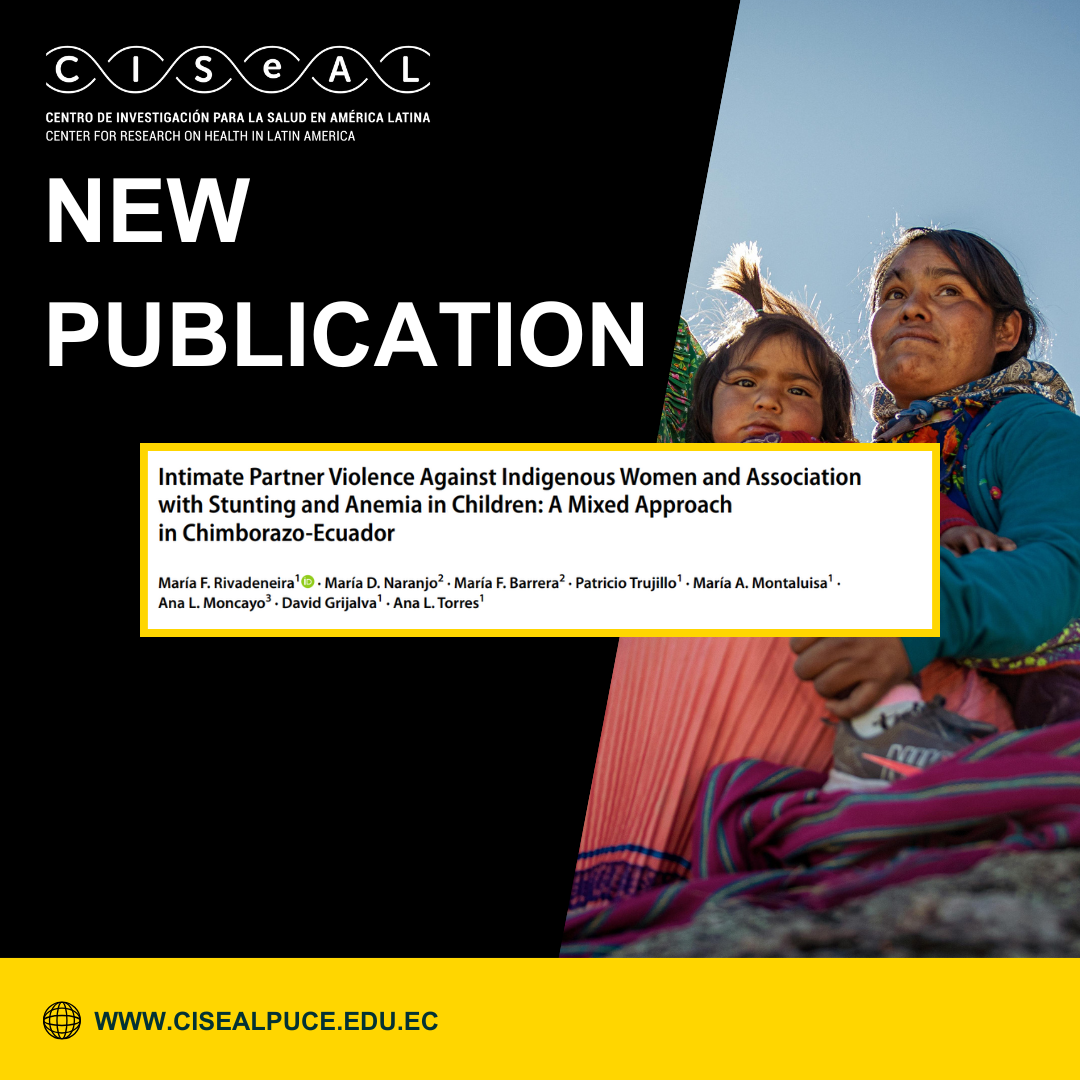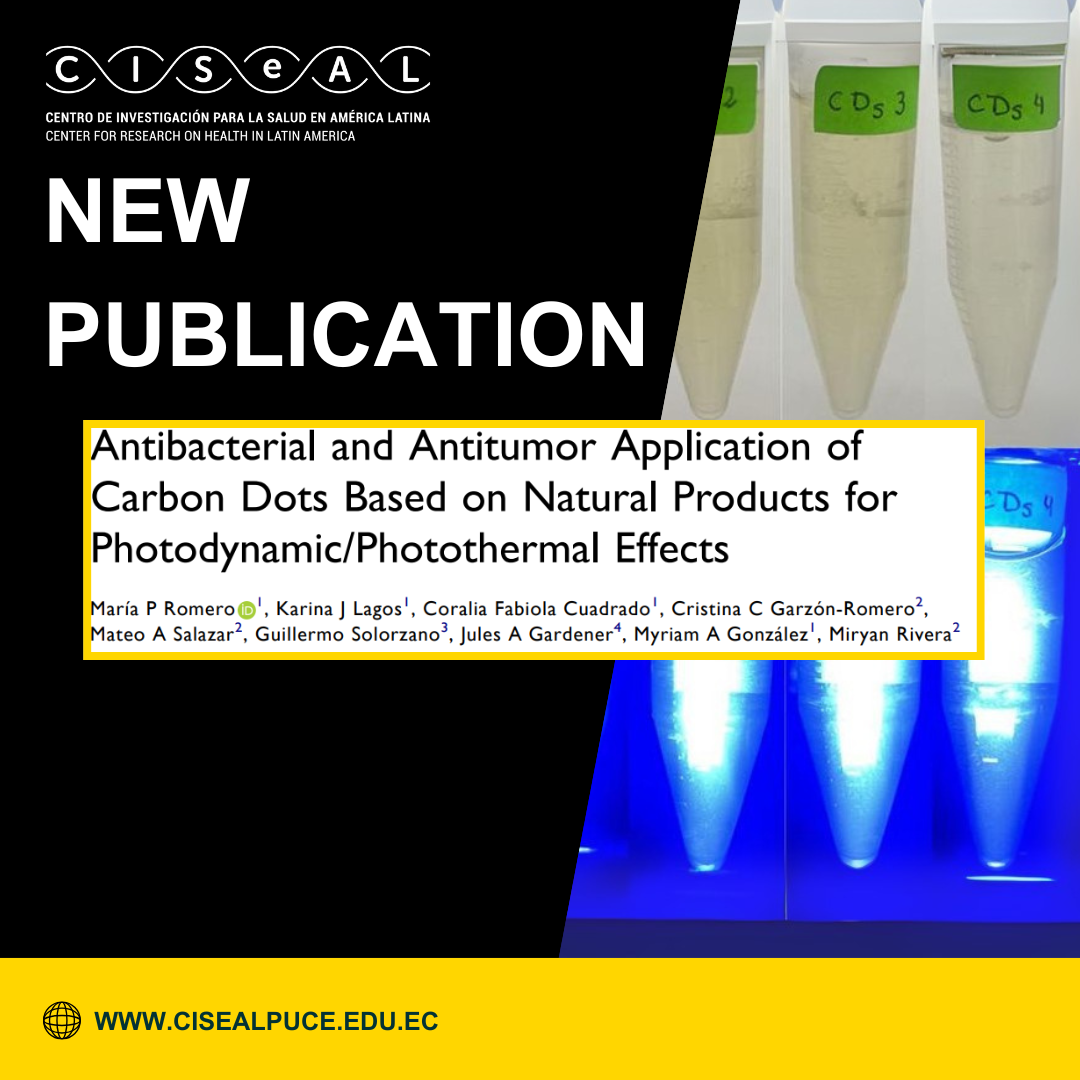
The article, in which Miryan Rivera, a CISeAL researcher, participates together with her laboratory technician Mateo Salazar, presents a green and efficient synthesis strategy for obtaining carbon dots (CDs) from natural products such as annatto (Bixa orellana), cinnamon (Cinnamomum verum), and turmeric (Curcuma longa), using a microwave-assisted technique that stands out for its speed, simplicity, and environmental compatibility. Four types of CDs (CDs1, CDs2, CDs3, and CDs4) were generated from aqueous dispersions of these extracts and sucrose, and were characterized by transmission electron microscopy (TEM), dynamic light scattering (DLS), Fourier transform infrared spectroscopy (FTIR), and Raman spectroscopy. The obtained CDs presented irregular shapes and sizes ranging from 2.3 to 3.7 nanometers, exhibiting luminescent and photoactivated properties with the ability to generate singlet reactive oxygen species (¹O₂) and produce temperature increases between 40 and 50 °C upon irradiation with blue light (450 nm, 40 mW·cm⁻²).
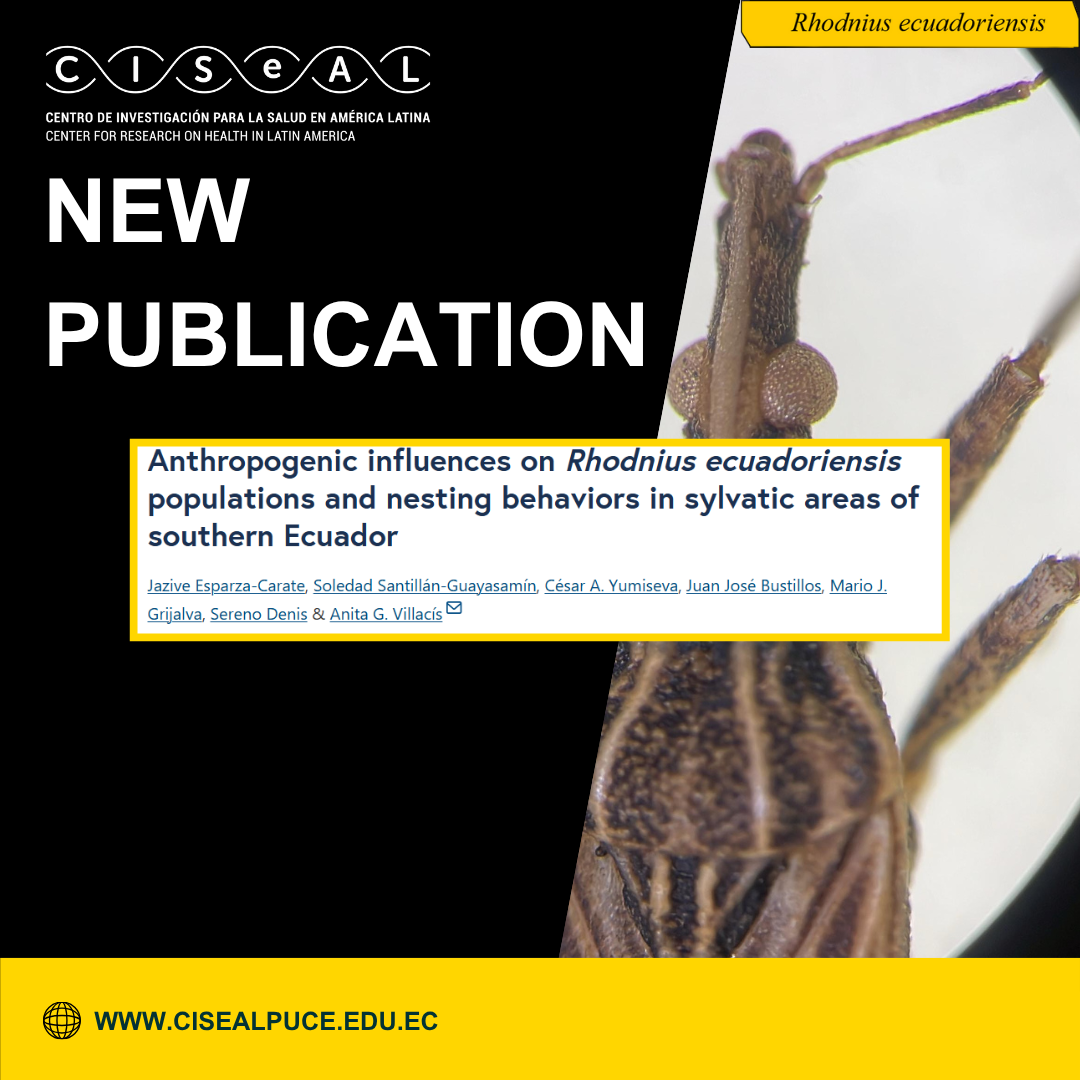 In her most recent publication, Dr. Anita G. Villacís, Principal Investigator at CISeAL, examines how environmental contamination influences the ecology of the vector Rhodnius ecuadoriensis in wild areas of southern Ecuador. Traditionally associated with wild environments, this insect has begun to adapt to human-influenced habitats, which represents a growing challenge for the control of Chagas disease.
In her most recent publication, Dr. Anita G. Villacís, Principal Investigator at CISeAL, examines how environmental contamination influences the ecology of the vector Rhodnius ecuadoriensis in wild areas of southern Ecuador. Traditionally associated with wild environments, this insect has begun to adapt to human-influenced habitats, which represents a growing challenge for the control of Chagas disease.
This research had the outstanding participation of Jazive Esparza, under the direction of Dr. Anita G. Villacís, in collaboration with experts such as Soledad Santillán-Guayasamín, César A. Yumiseva, Juan José Bustillos, Mario J. Grijalva, and Sereno Denis.
The study analyzed 389 nests collected in eight communities in the province of Loja during 2018, 2022, and 2023, differentiating between peridomestic and wild nests. The findings reveal a drastic reduction in the infestation rate in areas close to dwellings (from 33.3% in 2018 to 0% in 2022), while wild areas maintained fluctuating levels. A significant association was identified between triatomine infestation and mammal nests, many of which contained anthropogenic materials—especially near roads and other human-intervened areas.



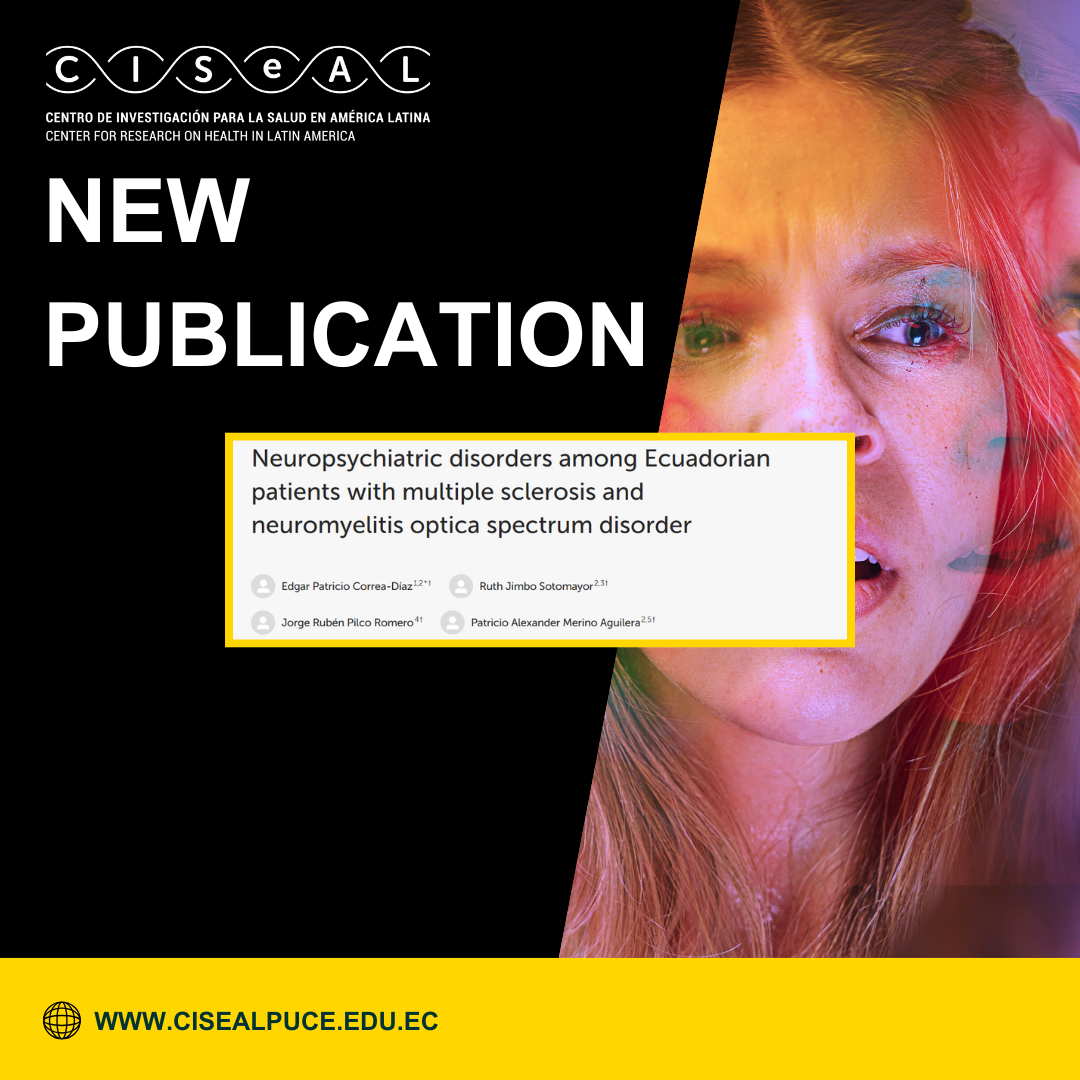 Our principal investigator at CISeAL, Dr. Ruth Jimbo, participated in a study that reveals the high prevalence of neuropsychiatric disorders in Ecuadorian patients with central nervous system demyelinating diseases—multiple sclerosis (MS) and neuromyelitis optica spectrum disorder (NMOSD)—treated at the Carlos Andrade Marín Hospital in Quito, a referral center that concentrates around 60% of MS cases and 70% of NMOSD cases in the country. The study included 151 adult participants (117 with MS; 34 with NMOSD) who met current international diagnostic criteria. Sociodemographic data and disability status (EDSS) were documented, and psychiatric instruments validated in Ecuador (Hamilton, BDI‑II, MINI, CGI‑BP‑M, ISO‑30) were applied by trained psychologists. Women and mestizo populations predominated in both cohorts; NMOSD patients were on average older (49.8 vs. 42.3 years) and had greater disability (mean EDSS 4.23 vs. 2.5), with more cases in the moderate/severe range. The overall prevalence of neuropsychiatric disorders was high: 70.9% in MS and 85.29% in NMOSD. Moderate/severe anxiety was significantly more frequent in NMOSD, while depression showed comparable rates between groups.
Our principal investigator at CISeAL, Dr. Ruth Jimbo, participated in a study that reveals the high prevalence of neuropsychiatric disorders in Ecuadorian patients with central nervous system demyelinating diseases—multiple sclerosis (MS) and neuromyelitis optica spectrum disorder (NMOSD)—treated at the Carlos Andrade Marín Hospital in Quito, a referral center that concentrates around 60% of MS cases and 70% of NMOSD cases in the country. The study included 151 adult participants (117 with MS; 34 with NMOSD) who met current international diagnostic criteria. Sociodemographic data and disability status (EDSS) were documented, and psychiatric instruments validated in Ecuador (Hamilton, BDI‑II, MINI, CGI‑BP‑M, ISO‑30) were applied by trained psychologists. Women and mestizo populations predominated in both cohorts; NMOSD patients were on average older (49.8 vs. 42.3 years) and had greater disability (mean EDSS 4.23 vs. 2.5), with more cases in the moderate/severe range. The overall prevalence of neuropsychiatric disorders was high: 70.9% in MS and 85.29% in NMOSD. Moderate/severe anxiety was significantly more frequent in NMOSD, while depression showed comparable rates between groups.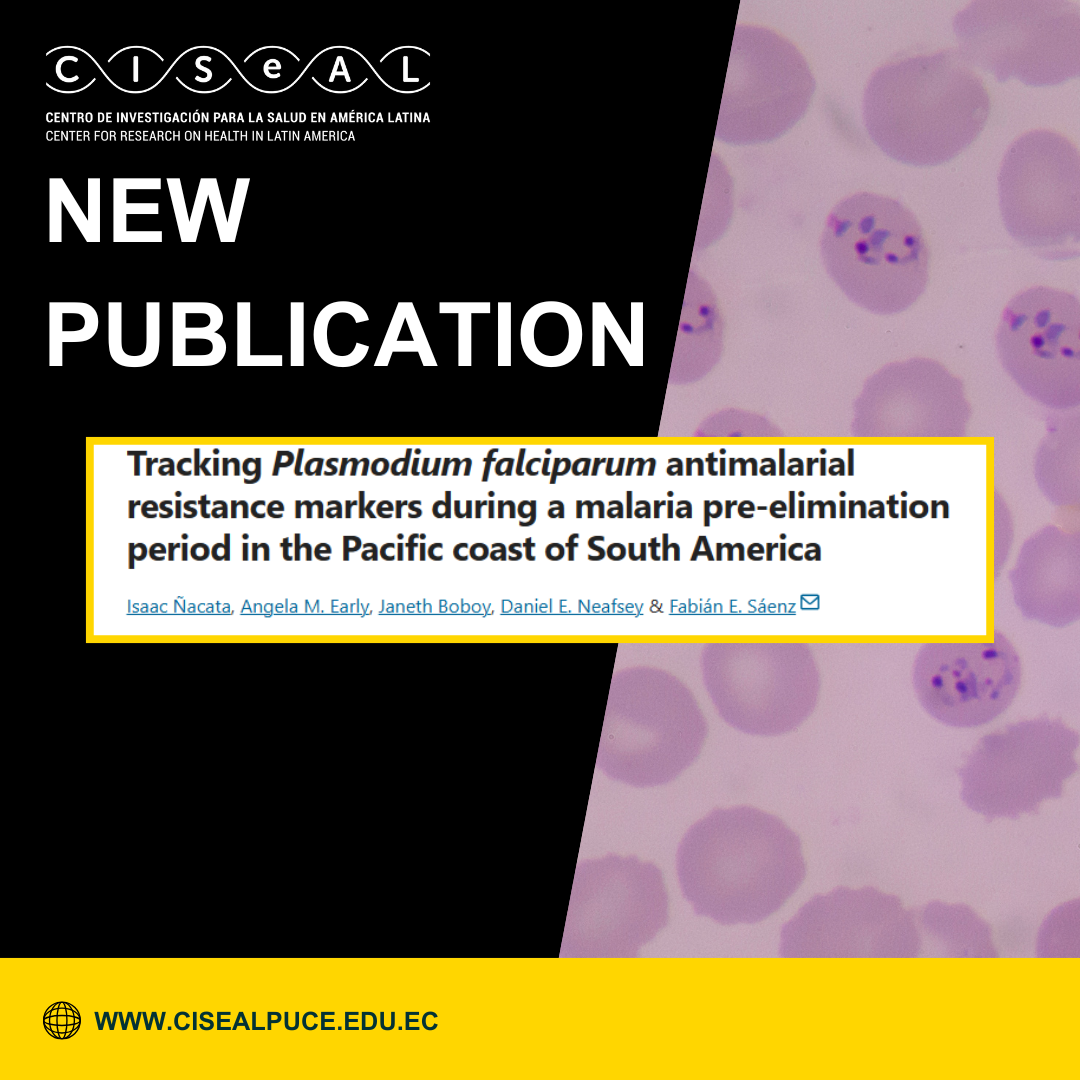 The study analyzes the dynamics of antimalarial resistance in Plasmodium falciparum on the Pacific coast of Ecuador during 2019–2021, a critical period toward malaria pre-elimination, with emphasis on the influence of pharmacological pressure and human migration. The study was led by Dr. Fabián Sáenz, principal investigator of CISeAL, and was developed from the Bachelor's dissertation work of Isaac Ñacata in Biological Sciences. The work evaluated resistance genes (Pfcrt, Pfdhps, Pfdhfr, Pfmdr-1, Pfk13, and Pfaat1) in samples from the Esmeraldas and Carchi provinces and compared the frequencies of resistance mutations with data from 2013–2015. The results show a significant increase in haplotypes resistant to chloroquine (Pfcrt) and pyrimethamine (Pfdhfr), evidencing strong selective pressure. In contrast, sensitivity to sulfadoxine (Pfdhps) and artemisinin (Pfk13) was maintained, with the wild-type haplotype present in 100% of samples. In addition, the A16V mutation in Pfdhfr, linked to resistance to proguanil, was identified for the first time in Ecuador. The NEDFSDFY haplotype was also detected in Pfmdr-1, associated with multidrug resistance, reflecting the complexity of the resistance landscape.
The study analyzes the dynamics of antimalarial resistance in Plasmodium falciparum on the Pacific coast of Ecuador during 2019–2021, a critical period toward malaria pre-elimination, with emphasis on the influence of pharmacological pressure and human migration. The study was led by Dr. Fabián Sáenz, principal investigator of CISeAL, and was developed from the Bachelor's dissertation work of Isaac Ñacata in Biological Sciences. The work evaluated resistance genes (Pfcrt, Pfdhps, Pfdhfr, Pfmdr-1, Pfk13, and Pfaat1) in samples from the Esmeraldas and Carchi provinces and compared the frequencies of resistance mutations with data from 2013–2015. The results show a significant increase in haplotypes resistant to chloroquine (Pfcrt) and pyrimethamine (Pfdhfr), evidencing strong selective pressure. In contrast, sensitivity to sulfadoxine (Pfdhps) and artemisinin (Pfk13) was maintained, with the wild-type haplotype present in 100% of samples. In addition, the A16V mutation in Pfdhfr, linked to resistance to proguanil, was identified for the first time in Ecuador. The NEDFSDFY haplotype was also detected in Pfmdr-1, associated with multidrug resistance, reflecting the complexity of the resistance landscape.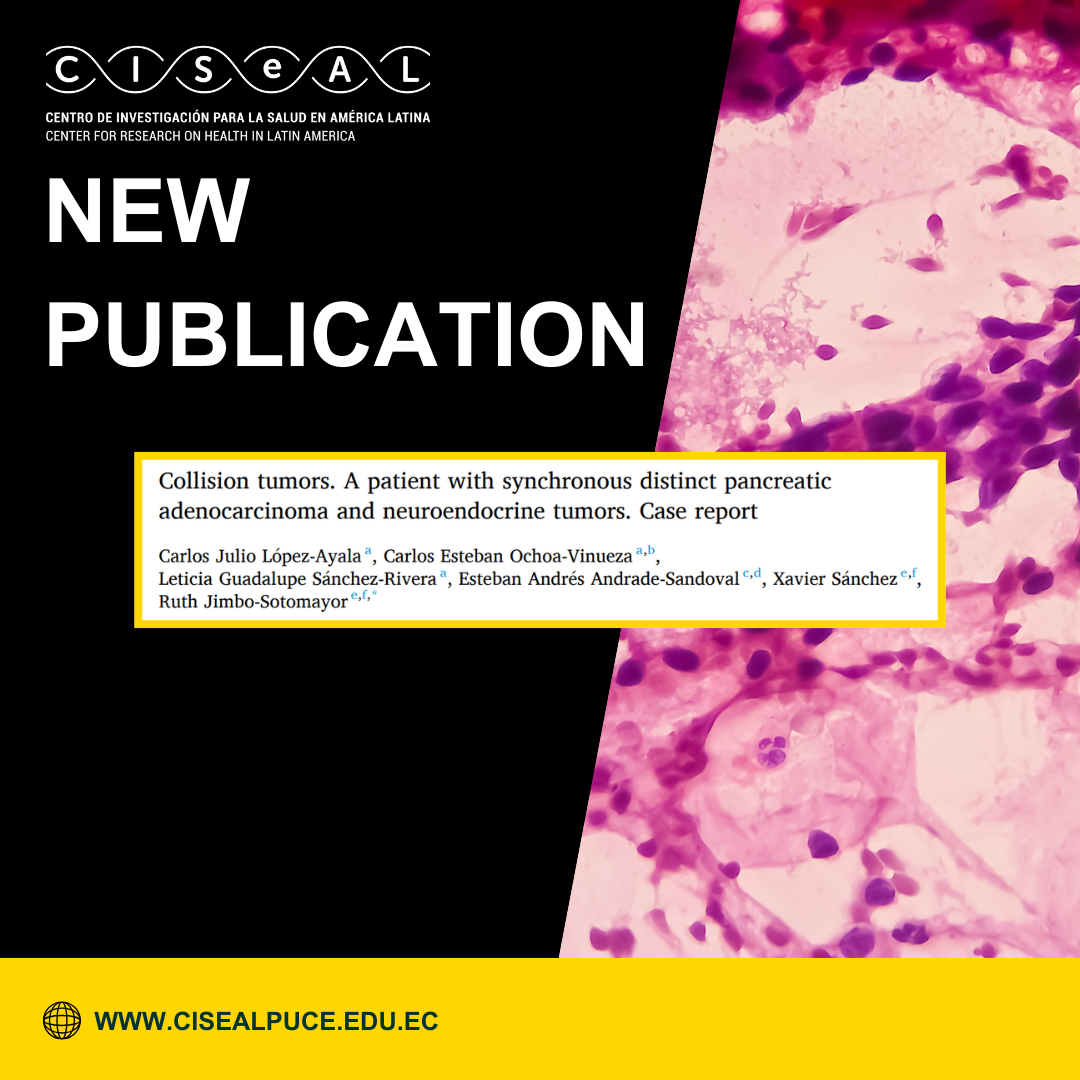 Pancreatic adenocarcinoma represents a growing problem in Western countries due to its increasing incidence, difficult early diagnosis related to nonspecific symptoms, and intrinsic aggressiveness that translates into low overall survival (≈12% at 5 years), whereas neuroendocrine tumors (NETs) generally show a better prognosis and, in the pancreas, account for only ~2% of pancreatic neoplasms; the synchronous coexistence of both within the spectrum of multiple primary tumors (5–10% in the population) is exceptional. In this context, and with the participation of CISeAL principal investigators Dr. Ruth Jimbo-Sotomayor and Dr. Xavier Sanchez, we document the case of a 52-year-old man with type 2 diabetes who presented with three weeks of abdominal pain, weight loss, and anorexia without jaundice; laboratory studies showed mild hyperbilirubinemia, elevated transaminases, and a cholestatic pattern, and MRCP plus angiotomography revealed dilation of the bile duct and duct of Wirsung along with an 18 mm lesion in the pancreatic head without vascular invasion, clinically staged as IA. After ERCP biliary stent placement and preoperative evaluation, a robot-assisted cephalic duodenopancreatectomy (Whipple procedure) was performed, allowing precise dissection and lymphadenectomy; the postoperative course was uneventful. Histopathology identified a moderately differentiated adenocarcinoma with perineural and lymphovascular invasion, three negative nodes, and pathologic stage IB (pT2 pN0 pMX), as well as a separate incidental finding: a well-differentiated neuroendocrine tumor confined to the pancreatic head (pT1 pN0 pMX) with a low proliferative index, constituting a synchronous collision-type (biphasic) tumor and not a mixed neuroendocrine–nonendocrine neoplasm (MiNEN), in which both components should be admixed and each represent >30% of the mass. The patient received six cycles of FOLFOXIRI chemotherapy over eight months and then concurrent chemoradiotherapy with capecitabine (total dose 50.4 Gy at 13 months) and continues to do well, with no evidence of tumor activity on quarterly follow-up.
Pancreatic adenocarcinoma represents a growing problem in Western countries due to its increasing incidence, difficult early diagnosis related to nonspecific symptoms, and intrinsic aggressiveness that translates into low overall survival (≈12% at 5 years), whereas neuroendocrine tumors (NETs) generally show a better prognosis and, in the pancreas, account for only ~2% of pancreatic neoplasms; the synchronous coexistence of both within the spectrum of multiple primary tumors (5–10% in the population) is exceptional. In this context, and with the participation of CISeAL principal investigators Dr. Ruth Jimbo-Sotomayor and Dr. Xavier Sanchez, we document the case of a 52-year-old man with type 2 diabetes who presented with three weeks of abdominal pain, weight loss, and anorexia without jaundice; laboratory studies showed mild hyperbilirubinemia, elevated transaminases, and a cholestatic pattern, and MRCP plus angiotomography revealed dilation of the bile duct and duct of Wirsung along with an 18 mm lesion in the pancreatic head without vascular invasion, clinically staged as IA. After ERCP biliary stent placement and preoperative evaluation, a robot-assisted cephalic duodenopancreatectomy (Whipple procedure) was performed, allowing precise dissection and lymphadenectomy; the postoperative course was uneventful. Histopathology identified a moderately differentiated adenocarcinoma with perineural and lymphovascular invasion, three negative nodes, and pathologic stage IB (pT2 pN0 pMX), as well as a separate incidental finding: a well-differentiated neuroendocrine tumor confined to the pancreatic head (pT1 pN0 pMX) with a low proliferative index, constituting a synchronous collision-type (biphasic) tumor and not a mixed neuroendocrine–nonendocrine neoplasm (MiNEN), in which both components should be admixed and each represent >30% of the mass. The patient received six cycles of FOLFOXIRI chemotherapy over eight months and then concurrent chemoradiotherapy with capecitabine (total dose 50.4 Gy at 13 months) and continues to do well, with no evidence of tumor activity on quarterly follow-up.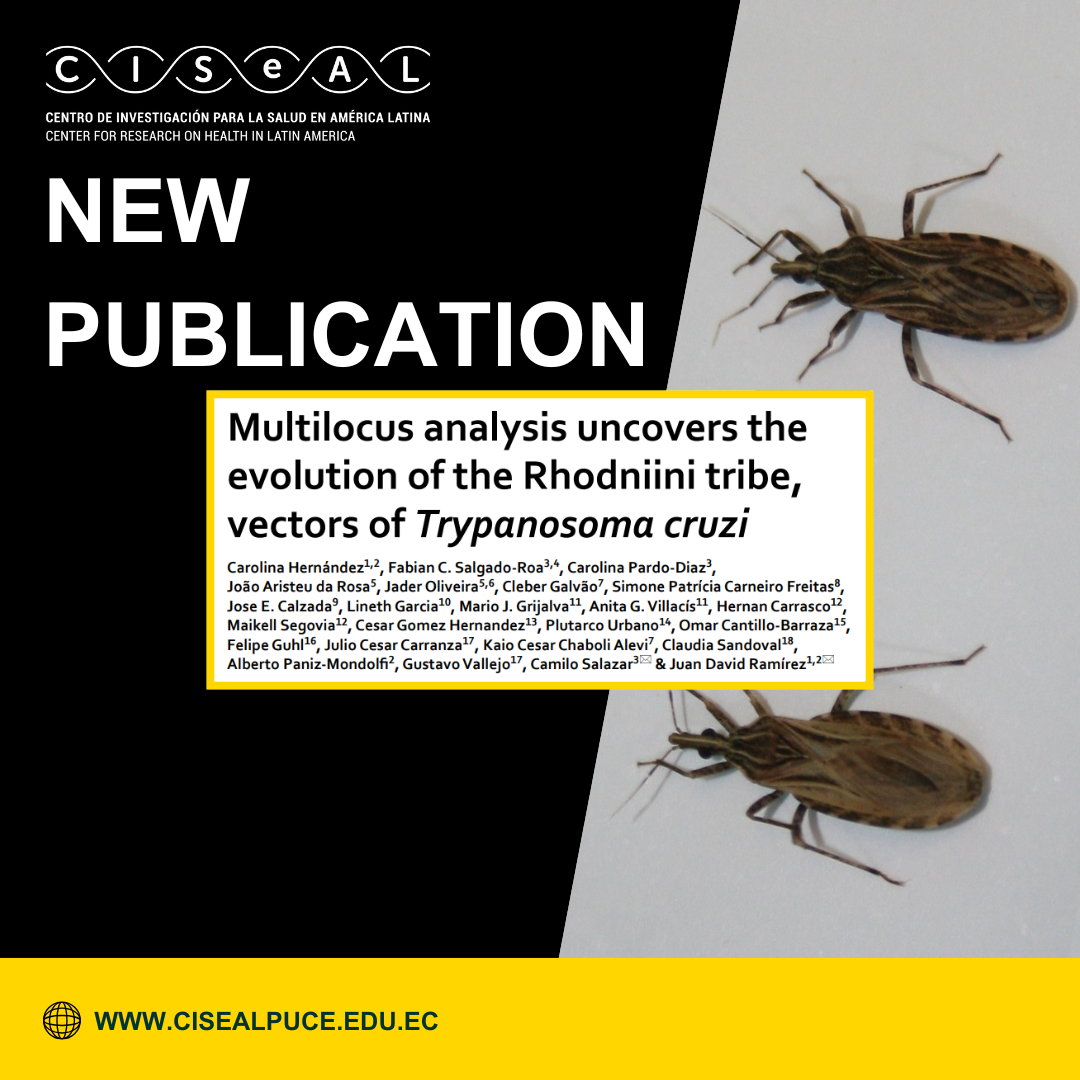 The most recent research in which CISeAL principal investigators Dr. Anita Villacís and Dr. Mario Grijalva participated sheds new light on the evolution of the group of insect vectors of Trypanosoma cruzi belonging to the tribe Rhodniini, fundamental in the transmission of Chagas disease. Through an unprecedented multilocus phylogenetic analysis, which included eight genes in 497 specimens of 17 species collected in seven countries, it was revealed that the current classification of this group does not reflect its evolutionary history. The paraphyly of the genus Rhodnius is confirmed, with the three species of the genus Psammolestes forming a monophyletic clade within it, although some alternative analyses position them as distinct sister groups. The prolixus group was found not to be monophyletic, in contrast to the pictipes and pallescens groups, which did show phylogenetic coherence. The divergence of the common ancestor of Rhodniini would have occurred approximately 5.26 million years ago, indicating a more recent origin than previously proposed, with key diversification events coinciding with Pleistocene climatic changes. Only four species—P. arthuri, R. ecuadoriensis, R. neivai, and R. neglectus—were consistently delimited as clear evolutionary units, calling into question the number of valid species recognized in the tribe.
The most recent research in which CISeAL principal investigators Dr. Anita Villacís and Dr. Mario Grijalva participated sheds new light on the evolution of the group of insect vectors of Trypanosoma cruzi belonging to the tribe Rhodniini, fundamental in the transmission of Chagas disease. Through an unprecedented multilocus phylogenetic analysis, which included eight genes in 497 specimens of 17 species collected in seven countries, it was revealed that the current classification of this group does not reflect its evolutionary history. The paraphyly of the genus Rhodnius is confirmed, with the three species of the genus Psammolestes forming a monophyletic clade within it, although some alternative analyses position them as distinct sister groups. The prolixus group was found not to be monophyletic, in contrast to the pictipes and pallescens groups, which did show phylogenetic coherence. The divergence of the common ancestor of Rhodniini would have occurred approximately 5.26 million years ago, indicating a more recent origin than previously proposed, with key diversification events coinciding with Pleistocene climatic changes. Only four species—P. arthuri, R. ecuadoriensis, R. neivai, and R. neglectus—were consistently delimited as clear evolutionary units, calling into question the number of valid species recognized in the tribe.